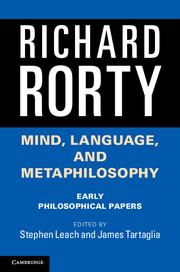Book contents
- Frontmatter
- Contents
- Foreword
- Acknowledgments
- Introduction
- 1 Pragmatism, categories, and language
- 2 The limits of reductionism
- 3 Realism, categories, and the “linguistic turn”
- 4 The subjectivist principle and the linguistic turn
- 5 Empiricism, extensionalism, and reductionism
- 6 Mind-body identity, privacy, and categories
- 7 Do analysts and metaphysicians disagree?
- 8 Incorrigibility as the mark of the mental
- 9 Wittgenstein, privileged access, and incommunicability
- 10 In defense of eliminative materialism
- 11 Cartesian epistemology and changes in ontology
- 12 Strawson’s objectivity argument
- 13 Verificationism and transcendental arguments
- 14 Indeterminacy of translation and of truth
- 15 Dennett on awareness
- 16 Functionalism, machines, and incorrigibility
- Index of names
Foreword
Published online by Cambridge University Press: 05 June 2014
- Frontmatter
- Contents
- Foreword
- Acknowledgments
- Introduction
- 1 Pragmatism, categories, and language
- 2 The limits of reductionism
- 3 Realism, categories, and the “linguistic turn”
- 4 The subjectivist principle and the linguistic turn
- 5 Empiricism, extensionalism, and reductionism
- 6 Mind-body identity, privacy, and categories
- 7 Do analysts and metaphysicians disagree?
- 8 Incorrigibility as the mark of the mental
- 9 Wittgenstein, privileged access, and incommunicability
- 10 In defense of eliminative materialism
- 11 Cartesian epistemology and changes in ontology
- 12 Strawson’s objectivity argument
- 13 Verificationism and transcendental arguments
- 14 Indeterminacy of translation and of truth
- 15 Dennett on awareness
- 16 Functionalism, machines, and incorrigibility
- Index of names
Summary
The acclaim and controversy that has surrounded Richard Rorty’s later work, starting with Philosophy and the Mirror of Nature in 1979, has tended to eclipse the influence of his major contributions to analytic philosophy of mind in the 1960s and 1970s. Like Hilary Putnam, whose papers from that era remain classics in spite of their author’s abandonment of them, Rorty shaped the field for subsequent decades with a series of insightful, constructive, imaginative papers harnessing the insights of Sellars and Quine, and developing his own distinctive varieties of pragmatism and naturalism. Rorty’s version of eliminative materialism was both the first and the subtlest, and anybody interested in defending any variation today would be well advised to mine his work for insights. The same can be said for his delicate and undoctrinaire treatment of functionalism.
I would venture to say that today’s combatants in the skirmishes over property dualism, supervenience, mental causation, and their subsidiary issues would find that most of their moves and countermoves were anticipated and preempted by Rorty’s discussions more than forty years ago. “Mind-Body Identity, Privacy, and Categories” (1965), “Incorrigibility as the Mark of the Mental” (1970), “In Defense of Eliminative Materialism” (1972), and “Functionalism, Machines, and Incorrigibility” (1972) ought to be required reading for all aspiring philosophers of mind today, as they were for us when they first appeared, and they are only the best known of his works from that period. Fortunately, Rorty wrote admirably clear and vivid philosophy which holds up well at this remove in time, so this volume will be a joy to read, both for those who remember the impact these essays had when they were published and for those who know Rorty only as the lightning rod of the later culture wars.
- Type
- Chapter
- Information
- Mind, Language, and MetaphilosophyEarly Philosophical Papers, pp. vii - viiiPublisher: Cambridge University PressPrint publication year: 2014



